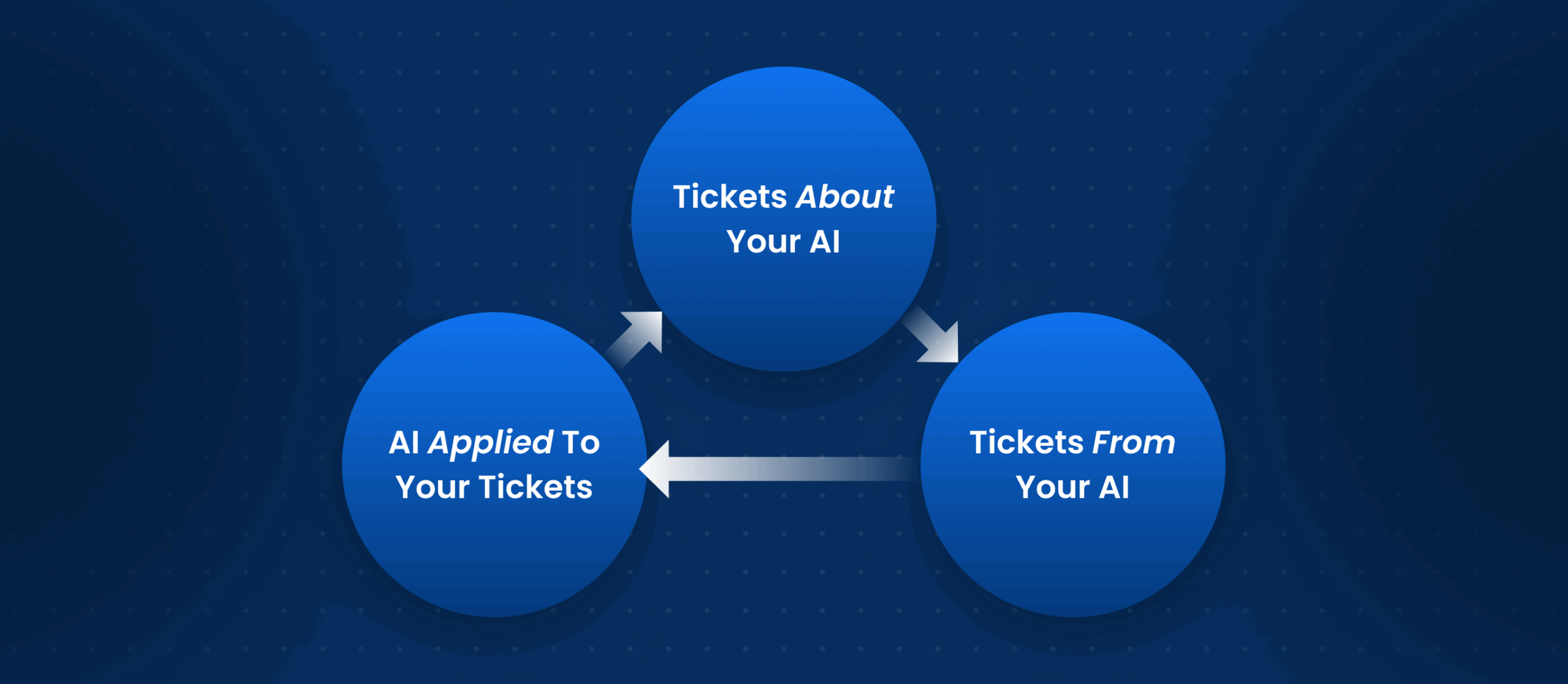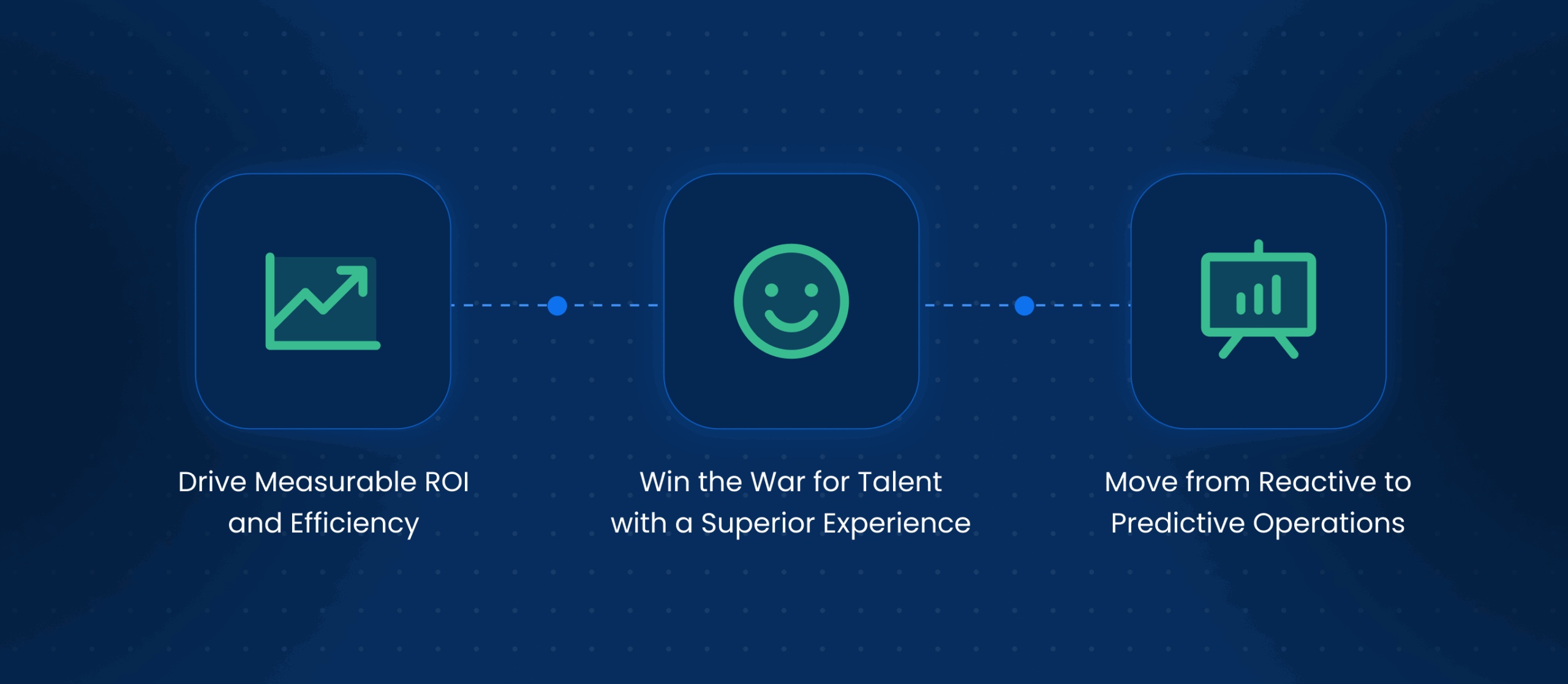Introduction
As we cross the midpoint of 2025, the term “Artificial Intelligence tickets” has officially moved from industry buzzword to a daily operational reality for every technology leader. If your 2024 strategy was about exploring AI, your 2025 mandate is about mastering it. The challenge is that the term itself means three distinctly different things, and your organization’s success depends on excelling at all three.
For today’s CIO, CTO, and IT Director, Artificial Intelligence tickets represent a three-front battle:
- Tickets About Your AI: The new, complex support requests needed to maintain your company’s critical AI infrastructure.
- Tickets From Your AI: The automated, predictive alerts generated by your smart monitoring tools.
- AI Applied To Your Tickets: The use of AI to intelligently manage and autonomously resolve support requests.

Attempting to handle this new ecosystem with a 2023 mindset is a recipe for inefficiency and risk. This guide is your playbook for the second half of 2025. We’ll dissect what Artificial Intelligence tickets truly are today and provide a clear framework to transform this complex challenge into your most powerful strategic asset.
The New Reality of Artificial Intelligence Tickets in 2025
To lead effectively, you must first understand the full scope of the challenge. The modern landscape of Artificial Intelligence tickets demands a sophisticated approach to each of its facets. You are no longer just managing a single queue; you’re orchestrating a digital supply chain of information.
First, your team is now responsible for a new and difficult class of Artificial Intelligence tickets related to the AI models your business relies on. These aren’t simple password resets; they are complex issues like model performance decay, data pipeline failures, or,most critically,reports of algorithmic bias that require specialized workflows and immediate escalation outside of IT.
Second, your proactive monitoring tools are now a primary source of Artificial Intelligence tickets. This is a good thing, in theory, as it allows you to fix problems before users are impacted. However, without proper management, this firehose of machine-generated Artificial Intelligence tickets can overwhelm your team, creating more noise than signal.
Finally, the most significant opportunity lies in how you apply AI to the entire ticket lifecycle. The ultimate goal is to create a system where the creation, routing, and resolution of all your company’s Artificial Intelligence tickets are handled with speed, intelligence, and a high degree of autonomy.
Unlocking the Strategic Benefits of AI Ticketing
Adopting a modern strategy for managing Artificial Intelligence tickets is one of the highest-leverage moves you can make this year. The benefits are tangible and extend directly to the company’s bottom line and employee morale.

Drive Measurable ROI and Efficiency
The old model of manual ticket handling is a major drain on resources. Every ticket an L1 agent touches has a cost. A modern approach to resolving Artificial Intelligence tickets uses automation to deflect the vast majority of these routine requests. This frees up your highly skilled (and expensive) human talent to focus on strategic work, dramatically lowering your operational costs and increasing the overall capacity of your organization.
Win the War for Talent with a Superior Experience
In today’s competitive job market, the digital employee experience is paramount. A slow, bureaucratic support process is a constant source of friction that hurts productivity and makes employees feel undervalued. A modern system for handling Artificial Intelligence tickets delivers the instant, on-demand experience people expect, allowing them to get help 24/7 in tools like Slack and Teams. This shows you respect their time and makes your company a more attractive place to work.
Move from Reactive to Predictive Operations
A world-class system doesn’t just resolve Artificial Intelligence tickets faster; it provides the insight to prevent them from being created in the first place. By analyzing ticket data in aggregate, you can identify recurring problems and systemic weaknesses in your technology stack. This allows you to shift from a reactive, break-fix culture to a proactive, predictive operational model that improves stability and resilience across the board.
A Look Under the Hood: Features of Modern Artificial Intelligence Tickets Systems
So, how does this work in practice? A platform designed for the 2025 reality of Artificial Intelligence tickets is built on a foundation of smart assistance and deep automation.
AI Ticket Assist: Empowering Your Human Experts
For the complex issues that require human expertise, AI Ticket Assist acts as a force multiplier for your team. When a new ticket arrives, the AI instantly gets to work:
- Summarizing User Intent: It reads the user’s message,no matter how long or unstructured, and instantly creates a concise summary of the problem.
- Enriching with Context: It automatically gathers relevant information, such as the user’s device, location, and recent ticket history, giving the agent a 360-degree view.
- Recommending Solutions: The AI scans knowledge bases and historical Artificial Intelligence tickets to suggest the most likely resolution, empowering the agent to solve the problem faster and more consistently.
This powerful AI Ticket Assist capability eliminates manual research and allows your agents to function at the highest level of their abilities.
Intelligent Automation for the Service Desk
This is where the system takes action. Intelligent Automation for the Service Desk is about building an engine that handles tasks autonomously. It means:
- Proactive Ticket Creation: When your AIOps tool predicts a server failure, the AI automatically generates a high-priority ticket.
- Smart Routing: The AI analyzes the content of all new Artificial Intelligence tickets to ensure they are immediately sent to the right specialist team, eliminating the frustrating “ticket ping-pong” between departments.
- Self-Healing Workflows: For machine-generated tickets, the system can trigger automated scripts to fix the underlying issue and close out the ticket, often with zero human involvement. This level of Intelligent Automation for the Service Desk is the backbone of a modern, efficient IT organization.
The Leena AI Breakthrough: Autonomous Resolution for Artificial Intelligence Tickets
Assistance and automation were the core goals of 2024. Here in mid-2025, the benchmark for leadership is autonomy. This is where Leena AI is fundamentally changing the game.
We believe the future for the vast majority of your Artificial Intelligence tickets is not just faster management, but complete, end-to-end autonomous resolution. We deliver this through Agentic AI.
An Agentic AI is an autonomous digital team member that is empowered to securely understand a request, connect to your enterprise systems, perform the necessary actions, and resolve the issue.
Consider the high-volume tickets that clog your queues every day:
- Password Resets
- Software Access Requests
- Account Unlocks
- VPN Troubleshooting
With Leena AI, an employee simply messages the AI Agent in Slack. The agent understands the request, authenticates the user, securely connects to your Active Directory or Okta instance, performs the reset or grants the permission, and confirms with the employee that the task is done. The entire lifecycle of these Artificial Intelligence tickets is measured in seconds, not hours.
This is more than a chatbot. It’s an autonomous workforce that handles a massive volume of your Artificial Intelligence tickets, delivering instant gratification to your employees and a powerful ROI for the business.
Building the Business Case: Resources & ROI Proofs for Your Strategy
As a leader, you need a rock-solid business case. The financial argument for modernizing your approach to Artificial Intelligence tickets is straightforward and compelling.
Here’s a simple framework for your CFO:
- Productivity Recapture: (Avg. Employee Cost per Hour) x (Hours Saved per Ticket) x (Total Annual Deflected Tickets)
- Operational Cost Savings: (Cost of Human-led Resolution) x (Number of Autonomously Resolved Tickets)
The key performance indicators you should be tracking and presenting in H2 2025 include:
- Autonomous Resolution Rate: The percentage of tickets resolved with zero human touch.
- Mean Time to Resolution: The average time from creation to confirmation.
- Employee Digital Experience Score: A measure of how easy it is for employees to interact with technology.
These Resources / ROI Proofs clearly demonstrate that investing in a modern platform for Artificial Intelligence tickets is a direct investment in company-wide productivity.
Frequently Asked Questions on Artificial Intelligence Tickets
-
As of mid-2025, what is the most overlooked aspect of managing Artificial Intelligence tickets?
The most overlooked aspect is governance for tickets about AI. Many companies still lack formal workflows for handling reports of model bias or performance drift. Establishing a clear process for these new, high-risk AI tickets is a critical priority.
-
How can we build a business case for upgrading our system for Artificial Intelligence tickets?
Start with a data-driven analysis of your current state. Identify the top 10 most common ticket categories and calculate the total time your employees and IT staff spend on them annually. This provides a clear, quantifiable baseline to demonstrate the potential savings from automating these specific Artificial Intelligence tickets.
-
Will advanced AI make our human service desk agents obsolete?
No, it makes them more valuable. By automating the high-volume, repetitive tasks, AI elevates your human agents to focus on complex, high-empathy, and strategic issues. This turns the service desk from a cost center into a hub of specialized expertise for managing the most difficult tickets.
-
How do we ensure security and compliance when an AI is autonomously resolving Artificial Intelligence tickets?
Security is foundational. Leading Agentic AI platforms like Leena AI are designed with enterprise-grade security, including secure, API-based integrations, strict role-based access controls, and comprehensive audit logs that track every action the AI takes on any of your tickets.
-
What is the most practical first step our organization can take today?
The most practical step is to launch a pilot program focused on your top 3-5 ticket types. Choose high-volume, low-complexity issues like password resets or software access. This allows you to demonstrate clear value and quick wins, building momentum for a broader strategy for all your tickets.
Learn more about Leena AI’s pioneering Agentic AI Architecture
Read Enterprise Customer Success Stories .
Check out why Gartner and many others recognise Leena AI as a leader in Agentic AI
Learn more about Voice-Enabled AI Colleague .
Sign up for our Webinars and Events








